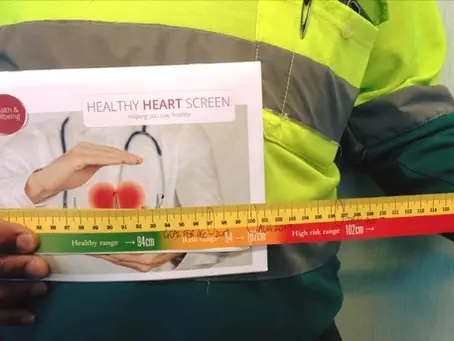Staying safe at work is about more than just wearing your high-vis vest and hard hat. It’s also about ‘joining the dots’ between your health and safety. Today we will discuss the impact of obesity, fatigue and stress.
Obesity, safety and injury risk. Overweight workers are more likely to experience health risks, longer periods of absence due to illness and higher health costs. This translates to workers that are less productive, more prone to injury and higher claim costs. Obesity increases the risk of injury, including an increased likelihood of slips, trips, falls and musculoskeletal injury. It is believed to be a factor in the increasing occurrence of workplace musculoskeletal injuries due to the mismatch between the overweight worker’s physical needs, abilities and limitations of the work environment, machinery, equipment and job tasks.
“We know that obesity prevention policies and programs in the workplace are important simply because of likely improvements in employee health,” – Pollack, the Leon S. Robertson Faculty Development Chair in Injury Prevention, John Hopkins University
In addition to this, our own client case studies have revealed the clear link between obesity and injury risk. You can see an example of that here.
Fatigue, safety and injury risk. Fatigue can have a serious impact on your ability to work safely and effectively. It reduces alertness and concentration, which can lead to errors and an increased rate of incidents and injuries. Think about your workplace. How would fatigue impact on safety? Do you work in the transport industry? Do your workers have to operate machinery? Does the job require a high level of concentration? When you consider that sleep deprivation can significantly reduce reaction time, motor control, decision-making ability and situational awareness, it becomes clear the link that this has to serious incidents, injuries and near misses in the workplace.
Stress, safety and injury risk. Work related stress develops because a person is unable to cope with the demands being placed on them. It has a negative influence on how people think, act and react which creates a clear link to high levels of absenteeism, staff turnover, increased error rates, accidents and injuries.
-
A study of over 3000 aircraft employees showed that employees who “hardly ever” enjoyed their job were 2.5 times more likely to report a back injury than those who reported “almost always” enjoying their job.
-
Another study found that employees with low job satisfaction are 30% more likely to have multiple injuries than those with high job satisfaction.
Reducing work-related stress can help to:
-
Improve employee mental and physical health
-
Reduce injury rates and absenteeism
-
Increase productivity and improve staff morale
Learn more and educate your workforce by booking a service with Health by Design today! The need for a safe and healthy workplace never stops. Simply email [email protected] to find out more about what options are available.

